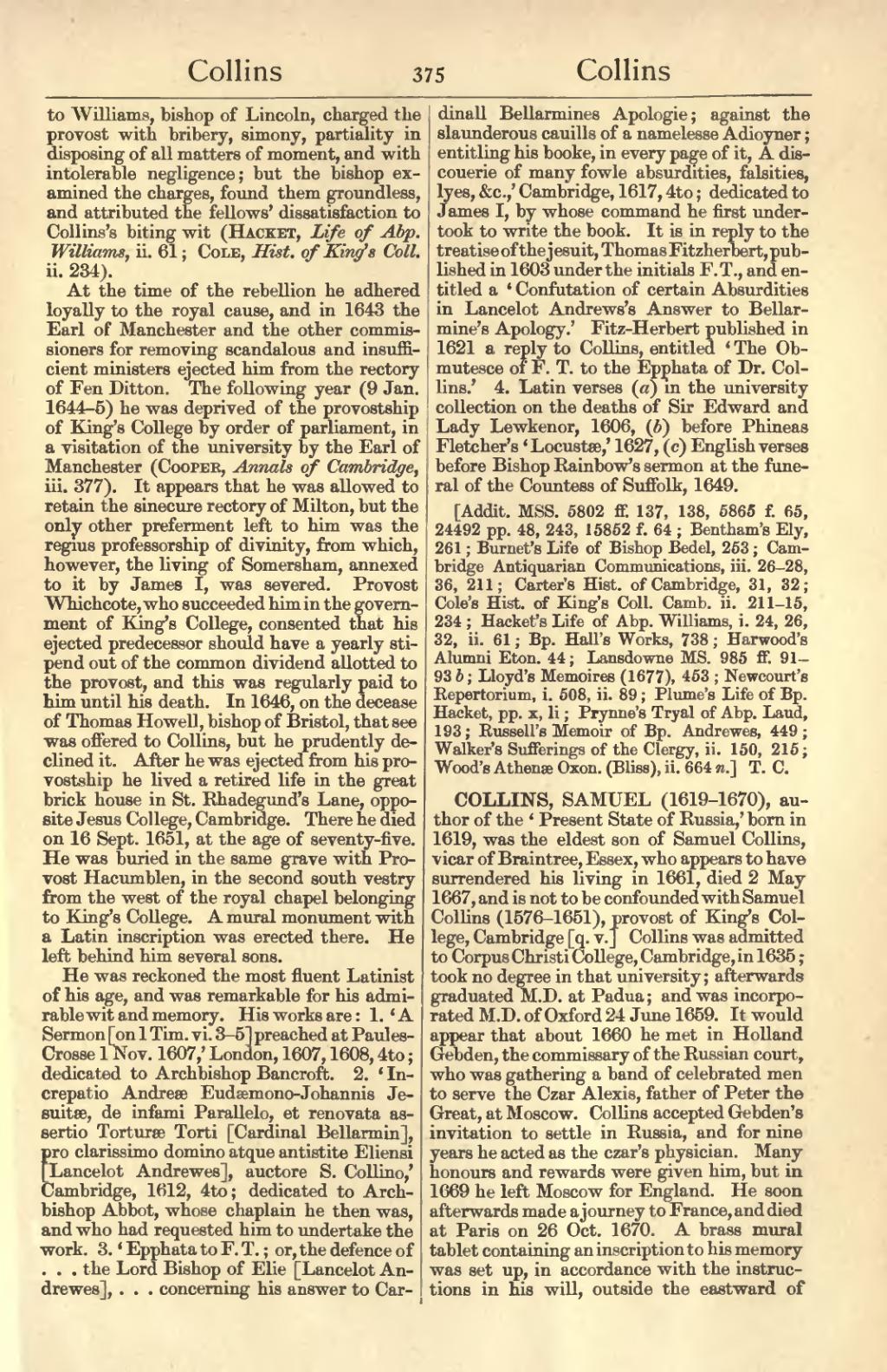to Williams, bishop of Lincoln, charged the provost with bribery, simony, partiality in disposing of all matters of moment, and with intolerable negligence; but the bishop examined the charges, found them groundless, and attributed the fellows' dissatisfaction to Collins's biting wit (Hacket, Life of Abp. Williams, ii. 61; Cole, Hist. of King's Coll. ii. 234).
At the time of the rebellion he adhered loyally to the royal cause, and in 1643 the Earl of Manchester and the other commissioners for removing scandalous and insufficient ministers ejected him from the rectory of Fen Ditton. The following year (9 Jan. 1644-5) he was deprived of the provostship of King's College by order of parliament, in a visitation of the university by the Earl of Manchester (Cooper, Annals of Cambridge, iii. 377). It appears that he was allowed to retain the sinecure rectory of Milton, but the only other preferment left to him was the regius professorship of divinity, from which, however, the living of Somersham, annexed to it by James I, was severed. Provost Whichcote, who succeeded him in the government of King's College, consented that his ejected predecessor should have a yearly stipend out of the common dividend allotted to the provost, and this was regularly paid to him until his death. In 1646, on the decease of Thomas Howell, bishop of Bristol, that see was offered to Collins, but he prudently declined it. After he was ejected from his provostship he lived a retired life in the great brick house in St. Rhadegund's Lane, opposite Jesus College, Cambridge. There he died on 16 Sept. 1651, at the age of seventy-five. He was buried in the same grave with Provost Hacumblen, in the second south vestry from the west of the royal chapel belonging to King's College. A mural monument with a Latin inscription was erected there. He left behind him several sons.
He was reckoned the most fluent Latinist of his age, and was remarkable for his admirable wit and memory. His works are: 1. 'A Sermon [on 1 Tim. vi. 3-5] preached at Paules Crosse 1 Nov. 1607,' London, 1607, 1608, 4to; dedicated to Archbishop Bancroft. 2. 'Increpatio Andreae Eudaemono-Johannis Jesuitae, de infami Parallelo, et renovata assertio Torturae Torti [Cardinal Bellarmin], pro clarissimo domino atque antistite Eliensi [Lancelot Andrewes], auctore S. Collino,' Cambridge, 1612, 4to; dedicated to Archbishop Abbot, whose chaplain he then was, and who had requested him to undertake the work. 3. 'Epphata to F. T.; or, the defence of . . . the Lord Bishop of Elie [Lancelot Andrewes], . . . concerning his answer to Cardinall Bellarmines Apologie; against the slaunderous cauills of a namelesse Adioyner; entitling his booke, in every page of it, A discouerie of many fowle absurdities, falsities, lyes, &c.,' Cambridge, 1617, 4to; dedicated to James I, by whose command he first undertook to write the book. It is in reply to the treatise of the Jesuit, Thomas Fitzherbert, published in 1603 under the initials F.T., and entitled a 'Confutation of certain Absurdities in Lancelot Andrews's Answer to Bellarmine's Apology.' Fitz-Herbert published in 1621 a reply to Collins, entitled 'The Obmutesce of F. T. to the Epphata of Dr. Collins.' 4. Latin verses (a) in the university collection on the deaths of Sir Edward and Lady Lewkenor, 1606, (b) before Phineas Fletcher's 'Locustae,' 1627, (c) English verses before Bishop Rainbow's sermon at the funeral of the Countess of Suffolk, 1649.
[Addit. MSS. 5802 ff. 137, 138, 5865 f. 65, 24492 pp. 48, 243, 15852 f. 64; Bentham's Ely, 261; Burnet's Life of Bishop Bedel, 253; Cambridge Antiquarian Communications, iii. 26-28, 36, 211; Carter's Hist. of Cambridge, 31, 32; Cole's Hist. of King's Coll. Camb. ii. 211-15, 234; Racket's Life of Abp. Williams, i. 24, 26, 32, ii. 61; Bp. Hall's Works, 738; Harwood's Alumni Eton. 44; Lansdowne MS. 985 ff. 9193 b; Lloyd's Memoires (1677), 453; Newcourt's Repertorium, i. 508, ii. 89; Plume's Life of Bp. Hacket, pp. x, li; Prynne's Tryal of Abp. Laud, 193; Russell's Memoir of Bp. Andrewes, 449; Walker's Sufferings of the Clergy, ii. 150, 215; Wood's Athenae Oxon. (Bliss), ii. 664.]
COLLINS, SAMUEL (1619–1670), author of the ' Present State of Russia,' born in 1619, was the eldest son of Samuel Collins, vicar of Braintree, Essex, who appears to have surrendered his living in 1661, died 2 May 1667, and is not to be confounded with Samuel Collins (1576-1651), provost of King's College, Cambridge [q. v.] Collins was admitted to Corpus Christi College, Cambridge, in 1635; took no degree in that university; afterwards graduated M.D. at Padua; and was incorporated M.D. of Oxford 24 June 1659. It would appear that about 1660 he met in Holland Gebden, the commissary of the Russian court, who was gathering a band of celebrated men to serve the Czar Alexis, father of Peter the Great, at Moscow. Collins accepted Gebden's invitation to settle in Russia, and for nine years he acted as the czar's physician. Many honours and rewards were given him, but in 1669 he left Moscow for England. He soon afterwards made a journey to France, and died at Paris on 26 Oct. 1670. A brass mural tablet containing an inscription to his memory was set up, in accordance with the instructions in his will, outside the eastward of
